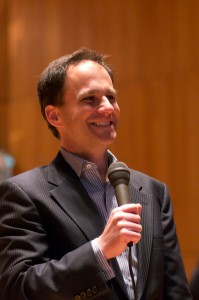 This post originally appeared on RJ.org
This post originally appeared on RJ.org
About 200 Jewish activists, rabbis, and communal leaders gathered in New York City for the Jewish Organizing Institute and Network for Justice’s (JOIN for Justice) recent National Summit. At the summit, JOIN for Justice honored the URJ’s Senior Vice President Rabbi Jonah Pesner with the Tekiah Social Justice Award.
Rabbi Pesner was honored for his work as a pioneer in the field of Jewish organizing and particularly for founding Just Congregations, the URJ’s groundbreaking community organizing effort. During his 20-year career, he has engaged thousands of synagogue congregants to join together in successful campaigns for health care access, affordable housing, public education, gay and lesbian rights, and rights for nursing care workers.
Speaking at the ceremony were Rabbi Rick Jacobs, president of the URJ; Rabbi David Saperstein, director of the Religious Action Center; and Rabbi Jennie Rosenn, Program Director, Jewish Life and Values, Nathan Cummings Foundation. Rabbi Rosenn’s remarks follow.
It feels most appropriate to be honoring Jonah in this sanctuary today. In 1996 I joined Jonah’s class for our final year of rabbinical school here at HUC. It just so happens that my most vivid memory of Jonah is of him sitting right there in the first row of that middle section. His hair down to his shoulders, he had a sort of, well, groovy air about him. Jonah had grown up in the bosom of the Reform movement, and was for all intents and purposes the quintessential poster child for the movement.
Though we respected each other from a distance, we really didn’t know each other well. Upon ordination, I went off to be a Hillel Rabbi at Columbia University, and Jonah became an Assistant Rabbi in Westport, Connecticut. And I think it is safe to say, we didn’t expect to see each other again outside of the occasional rabbinic conference.
Fast forward seven years. I had just come to the Nathan Cummings Foundation and as part of developing the field of Jewish social justice, I was thinking about how to grow congregation-based community Organizing beyond the handful of synagogues that did organizing back then. Everyone I talked with about it kept telling me about Temple Israel, this synagogue in Boston that really “got” organizing – and no one could tell me about Temple Israel without mentioning in the same breath a remarkable young rabbi named Jonah Pesner.
Around this same time, it became clear to me that the Reform Movement was key to bringing congregation-based community organizing to a larger scale. I began to have conversations with Rabbi Eric Yoffie, the then-president of the Reform Movement, and with Rabbi David Saperstein, Director of the Religious Action Center – conversations about what it would mean to introduce organizing to many more congregations across the country. I would say they were intrigued and skeptical in about equal measure.
It was not until Jonah came into the picture as a trusted Reform rabbi beloved by his community that Eric and David could fully get on board. And quite honestly, it was not until Jonah took a huge leap of faith leaving Temple Israel to start Just Congregations that the Nathan Cummings Foundation could fully get behind it. Over the last decade, first locally and then on the national stage, Jonah has played an absolutely pivotal role in the burgeoning of organizing in the Jewish community.
In a few minutes, David will speak about Jonah’s impact on the Reform Movement’s social justice work. But I just want to preface that by saying that beyond engaging scores of Reform synagogues across the country in organizing through Just Congregation, Jonah has been an inspiring teacher and mentor to seminarians, working with Jeannie Appleman and Meir Lakein, to train several hundred rabbinical students who in turn are engaging their communities in meaningful social change, joining together across lines of religion, race, and class, all while strengthening the fabric of their congregations. Just as Jonah has been central to the seminary training, so too JOIN for Justice has been blessed to have Jonah’s leadership at the helm.
Indeed Jonah’s leadership has been instrumental to making real the vision of a Jewish community that is developing leaders, building power, and bringing our world closer to wholeness. But what is it about Jonah that makes him such an exceptional leader and someone so many of us learn from? Is it his charisma? His passion? His incredible loyalty? Is it Jonah’s impressive ability to access to his inner preacher? Or how deeply he feels things? Is it his ability to be “relational” at a moment’s notice? Or who knows, maybe it’s the frequency with which he is moved to tears?
I am sure none of these things hurt!
But I actually believe that the power of Jonah’s leadership rests in no small part in the way in which his activism and Jewish life are authentically tied up with one another. This week’s Torah portion, Kedoshim, sometimes referred to as the holiness code, is unique in the way in which it indiscriminately mixes ritual mitzvot with social mitzvot.
In the same passage, we are told not to wear clothes made of two kinds of material and that we should leave the fallen fruit of our vineyard for the poor and the stranger. We are told the proper way to offer a sacrifice to God, what today has become prayer. And we are instructed that the wages of a laborer should not be held until the next morning.
Implicit in this quick succession of laws is the assertion that religious life and work of social justice are most powerful when woven together.
We are cautioned in this week’s parsha not to let organizing become a religion or let ritual distract us from acting justly.
And indeed Jonah’s life is a profound embodiment of the intertwining of the two. Every organizer’s fundamental tools are themselves and their stories. What is most powerful about Jonah’s stories are the way in which his commitment grows from a deep combination of the ethical and the religious. His is an activism growing out of faith and a faith that points towards action in the world.
To know Jonah is to know what it means to lead from a place of deep power that emerges from this union. It is why we honor Jonah this afternoon for his tremendous leadership and it is why we are inspired by him to look inside ourselves to find that place of meeting – that place where our spiritual lives meet our lives as activists. For it is in this place that transformation of ourselves, our communities, and our world is truly possible.
Thank you Jonah for giving us this opportunity to celebrate and honor you, our colleague, our teacher, and my friend.
 Kate Bigam is the URJ’s Social Media and Community Manager. Prior to this, she served as a Congregational Representative for the URJ’s East District and at the Religious Action Center as Press Secretary and as a 2007-2008 Eisendrath Legislative Assistant. She is a native of Cuyahoga Falls, Ohio, and currently resides in Portsmouth, N.H.
Kate Bigam is the URJ’s Social Media and Community Manager. Prior to this, she served as a Congregational Representative for the URJ’s East District and at the Religious Action Center as Press Secretary and as a 2007-2008 Eisendrath Legislative Assistant. She is a native of Cuyahoga Falls, Ohio, and currently resides in Portsmouth, N.H.






